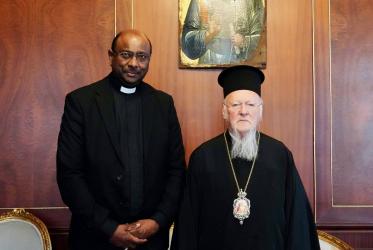sent by the WCC general secretary to the Ecumenical Patriarch Bartholomew I
Your All Holiness,
It is with a sense of profound sadness that we received the news of the falling asleep of our beloved father in Christ, Metropolitan Chrysostomos of Ephesus.
Metropolitan Chrysostomos will be remembered as an outstanding leader and a pioneer in inter-Christian dialogue and in the articulation of an authentic and creative Orthodox contribution to the ecumenical movement. In the World Council of Churches, he will be particularly remembered as an eminent theologian and church leader, as member of the Commission on Faith and Order, as vice-moderator of the central committee (1983-1991) and as one of the Council's presidents (1998-2006).
As a professor of theology and a senior representative of the Ecumenical Patriarchate, Metropolitan Chrysostomos played an active role in ecumenical discussions since the early 1950s. In the area of bilateral dialogues, he contributed to the inauguration of the dialogue with the Reformed churches, and to the ground-breaking theological agreements with the Oriental Orthodox churches.
The visionary and formative influence of Metropolitan Chrysostomos was perhaps most felt during the Pan-Orthodox preconciliar conferences that addressed some of the most critical issues facing the churches in the modern world, and that produced the foundational document on "Orthodoxy and the Ecumenical Movement" (1986). Metropolitan Chrysostomos was known not only for his theological gifts, but also for his profound familiarity with, and sensitivity to, pastoral concerns, including the impact of new developments in biotechnology, and the place of people with disabilities in society.
It is, however, in the most recent period that Metropolitan Chrysostomos played his most essential role in the life of the World Council of Churches. As co-chairman of the Special Commission on Orthodox participation in the WCC, for the first time the long-standing concerns of the Orthodox churches were listened to and addressed, and a series of fundamental reforms were introduced in the WCC.
There is no doubt that the spiritual integrity and theological rigour of Metropolitan Chrysostomos were primary factors for the success of the Special Commission and for the renewed ecumenical commitment and confidence of the Orthodox churches at this time.
Metropolitan Chrysostomos will be remembered by many Christians of all church backgrounds as an earnest figure, who, in prayer, thought and action constantly strove for unity in faith among Christians. For this gift, and for his life, we give eternal thanks.
Yours in Christ,
Rev. Dr Samuel Kobia
General Secretary



